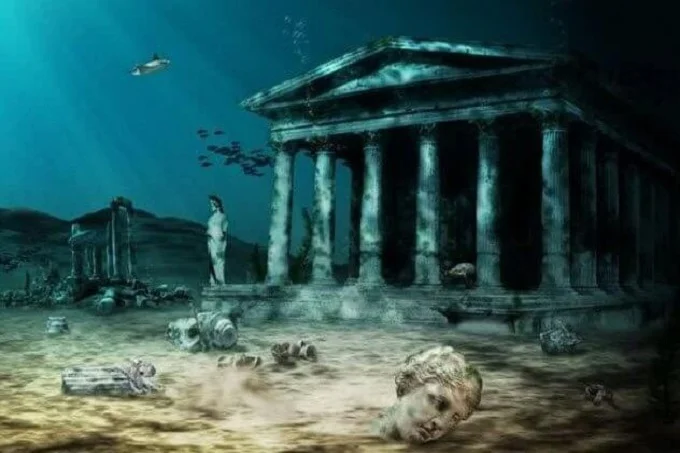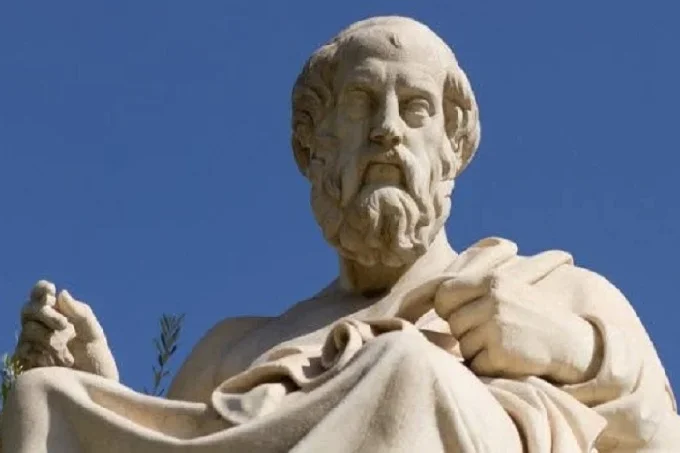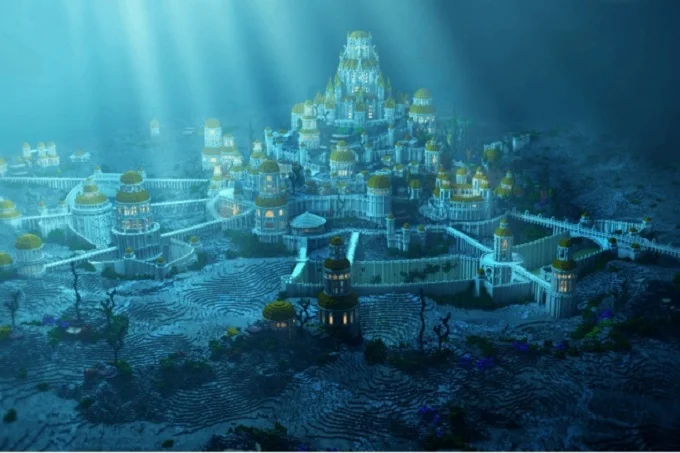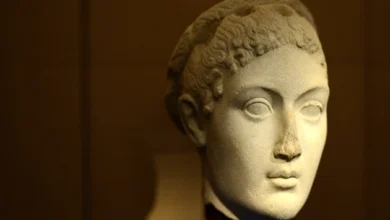Atlantis history and what happened to the lost city

Atlantis, the mythological island that disappeared in a single day, is well-known. Who was the first to find out about it? Is it true that Atlantis was a real place? What do we know about it that we don’t already know?
The story of Atlantis was brought down to us via the Greek philosopher Plato. “Timaeus” and “Critias,” two of his classics, come to mind. These writings are estimated to have been written in the year 360 BC. Even though we now know that Atlantis could exist as a consequence of these efforts, the mystery of Atlantis’ disappearance remains a mystery to many historians. There are just too many puzzles and questions in this book, and solving them isn’t always possible. Regardless, scientists were able to find a number of previously unknown facts concerning Atlantis.
According to Plato’s writings, the Greek Sage Solon became aware of this episode while serving as a priest in Egypt. When Solon returned, he told his relative, Dropidus, about it. Dropidas then handed it along to his son Critias, who notified his grandson, named Critias, who finally alerted Socrates and his entourage.
This collection should not be taken as historical or scientific fact but rather as an accurate transcription of Plato’s dialogues. It is up to each of us to determine whether we believe in mythology or not. Although science does not yet know all of the answers to Atlantis, the lost cities have been unearthed and will be discovered in the future. In the future, it has the potential to become a well-known island.
What happened to the lost city of Atlantis?
Several books and films have been published on the location of Atlantis. Some individuals believe that Santorini was previously Atlantis, and that the oceans of Bimini hide a passage to the ancient city, according to a simple Google search. Plato’s writings will inform us where the city that is now submerged was once located if we utilize them as a guide.
According to the book, Atlantis “broke out of the Atlantic Ocean.” “In front of the Pillars of Hercules, there was an island,” it says. The Strait of Gibraltar, a narrow stretch of sea that separates Spain and Africa, should be built today with these pillars. While these are not GPS coordinates, they do assist in locating the island.
In 2011, archaeologist Richard Freund of the University of Hartford and his colleagues discovered “memory cities,” or communities built in the image of Atlantis. A plethora of ancient villages have been found buried in the bolts of Donana National Park, north of Cadiz, Spain.
Cadiz ended up being right in front of the pillars. This led Freund to conclude that the real Atlantis was buried in the mud marshes of the Atlantic Ocean. The results back with the plot’s assertion that “the sea in some sections is inaccessible and impenetrable since there is fine muck on the route; and it arose as a result of the island’s sinking.”
The following subjects are sure to stimulate your interest:
Cadiz is also recognized as one of Western Europe’s oldest cities. The Phoenicians are assumed to have built it about 700 BC, while other texts say it existed as early as 1100 BC. This city, according to Greek tales, is much bigger.
What does this have to do with anything? Because Hades was formerly the name of this city. This is appropriate given that Hades’ primitive inhabitants describe an Atlantean prince called Gadeir in the story. He was the owner of Atlantis’ far eastern region.
In modern times, this island segment was designed to face Cadiz. Cadiz, or Hades, is claimed to have been named for the prince as a consequence. Of course, Plato wrote all of this at least 340 years after the city was found, so he had complete freedom in naming the Atlantic rulers.
What was the origin of the name Atlantis?
The majority of people believe Atlantis was named after the Atlantic Ocean, yet this is not the case. According to tradition, Poseidon, the Greek god of the seas, had five twins with a mortal Atlantean woman named Clito.
God assigned each of his ten sons to oversee a certain part of the island. Gadeira was the oldest son of the family. Even though a Spanish city was named after him, it was his elder brother Atlas who had the honor of naming the city. As the firstborn, Atlas acquired a massive island, and the ocean around it was named after him. His descendants were also to rule Atlantis forever.
What is known about the society of Atlantis?
At least two writings on Atlantis are known to have been written by Plato. Timaeus is now complete, however, Critias is still missing.

“Critias” comes to a close when Zeus, the head of the Greek gods, “gathered all the gods into their most sacred house, which, being positioned in the heart of the world, overlooks all created things.” When he gathered them together, he said the following: “that is all”.
It’s unknown if Plato purposefully left the work unfinished or whether the completed text was lost through time. Not only do we lack the conclusion to Critias, but we also believe Plato authored or at least meant to write, Hertocrates, the third book on Atlantis.
This idea is backed up by a slew of evidence. A phrase in “Critias,” reads, “we will fulfill your request and provide, if required, Hermocrates in the same manner as you and Timaeus.” As a consequence, the last part of the story should be centered on Hermocratus.
Furthermore, the titles of the three volumes may have a hidden significance, especially when seen in the order in which Plato wrote or should have written them. Timaeus gets his name from the Greek word tio, which means honor. The term Critias comes from the Greek word krima, which means “to judge.” Hermocrates is derived from “Hermes,” the messenger of the Greek gods. Timaeus admires the courage of the ancient Athenians. Critias allegedly ends Zeus’ trial over Atlantis. On the other side, what message would Hermocrates deliver?
The answer might be found in our knowledge of Hermocrates. He was a genuine military leader during the Peloponnesian War, leading the successful defense of Syracuse against Athens. It makes me think about Atlantis’ history. In this legend, an ancient Athenian nation repels an attack by Atlantis’ stronger forces.
Hermocrates’ lecture might have been on why Athens’ attack on Syracuse failed and how Syracuse was able to withstand the attack. Until someone finds a copy of this book, we may never know the whole narrative of Atlantis.
Atlantis existed for a minimum of 11,500 years.
Solon was often considered as the greatest Greek philosopher of all time. According to the sources, the tale of Atlantis was told to Solon in Egypt when he sought to “extract” their most ancient traditions from the priests.
Solon intended to do this by recounting the most ancient Greek stories he could recollect to the priests. With them, he spoke about the tremendous flood and the first man. After listening to Solon, one priest exclaimed, “Oh, Solon, Solon… There are no old persons among you.” “Consciously, you are all new; no old concept has been handed down the centuries among you.”
The priest then disclosed that Solon’s hometown, Athens, was far older than he had previously believed. The Egyptian archives at Sais (where they were) said that Sais was founded 8000 years ago. According to legend, Athens was established 1000 years before Sais, and the Athenians were at war with the Atlanteans at the time.
Solon was a Greek general who flourished from 630 to 560 BC. According to this story, Atlantis fell apart about 9500 BC. That Atlantis is at least as old as Gobekli Tepe, the world’s oldest temple, which was erected 10,000 years ago, suggests. The novel’s narrative begins to take shape. Everything, however, is veiled in mystery.
Is Atlantis a legend or a historical fact?
As previously stated, this list cannot be considered a historical overview. On the other hand, Critias claims that his version of events is correct in the text. “Listen to a strange story that is definitely true and backed up by Solon.” Plato highlights the need of differentiating fact from history in his dialogues. Plato claims that certain stories are symbolic in character. In his work, however, he claims that Atlantis was real and not a myth. If Atlantis was Plato’s fiction, why would he accept that the story of Atlantis is true but not that Greek myth was created to signify something else?
The kingdom of Atlantis was a great one
When most people think about Atlantis, they see a beautiful green island surrounded by deep blue ocean waters. Despite the fact that the story takes place on an island, most of us assume Atlantis was isolated there. Plato, on the other hand, thinks that Atlantis was a controllable kingdom based on this island. “On this island of Atlantis, there was a wonderful and majestic monarchy that ruled over the whole island and many others, as well as portions of the continent, and the residents of Atlantis also conquered Libya to the Pillars of Hercules, Egypt, and Europe to Tyrrenia.”
Tirrenia is another name for Etruria, which is now known as central Italy. As a consequence, modern-day Tuscany in Europe and Egypt in Africa would be part of Atlantis. We’d be curious as to how the Athenians were able to defeat such a formidable country. Plato may not have realized; therefore he decided not to finish the conclusion.
What did the people of Atlantis understand?
While it’s plausible that Plato built Atlantis for philosophical purposes, one component of the narrative would be difficult to replicate. In the tale, an Egyptian priest informs Solon, “This island opened the way to further islands, and from them, you may go to the other continent, which covered the genuine ocean.” “The next nation is unquestionably a continent that never ends.”

What kind of continent existed on the opposite side of the Atlantic, so large it seemed to be surrounded by an entire ocean? Could this mean that the ancient Greeks and Egyptians were aware of and visited the Americas?
In 1970, the renowned sailor Thor Heyerdahl set off with a crew of six on the reed ship Ra II. They sailed from Safi to Morocco and then across the Atlantic to Barbados in 57 days. This mission proved that reed boats could survive ocean voyages and that ancient peoples could cross the Atlantic Ocean in them. This achievement was formerly thought to be impossible. However, this does not prove that Egyptians or Greeks settled in America. Heyerdahl has just proved that it is possible.
In ancient Athens, women were allowed to serve
In developed countries, women in the military is an issue that is often debated. Is it appropriate for women to serve in combat units? Is it proper for a woman to sign a service agreement? If the Greeks had heard our questions 2500 years ago, they would have laughed. “Silence is the glory of a woman,” Plato’s student, Aristotle, is said to have said. What would happen if a Spartan lady applied to join the army? They would not warmly receive it.
In Athens, 9500 BC, everything was different. According to Plato, “Military service was prevalent for men and women in full armor and under the auspices of the goddess Athena, could practice the same martial arts exercises, without any gender discrimination.”
Plato may have just dreamed about an ideal state, or he may not have. In 9500 BC, the Athenians may have done their utmost to hold the invaders at bay.
Plato advised people to avoid ocean
Would they want others to know if the Greeks really understood what lay beyond the Mediterranean? Possibly not. Perhaps this is why Plato warned against crossing the Atlantic. “But then there were massive earthquakes and floods, and all warring men withdrew underground in one day and one night of sadness, and the island of Atlantis plummeted into the depths of the sea in the same way.” According to Plato, impassable mud formations evolved surrounding the Strait of Gibraltar as a result.
This might put off potential tourists from crossing the strait. “Because the Atlantic was navigable in those days,” Plato said, “it was impossible for him to sail to the Atlantic during his lifetime.”
Is it possible that Plato was seeking to prevent humans from crossing the Atlantic? Is he really convinced that shallow dirt obstructs ocean travel? Is it feasible that the Atlantic at the time was too filthy for ships to get through? Why not just walk if the water was too shallow for the boats?
Will humanity be extinguished?
In comparison to the Egyptian priest’s stories, none of Solon’s were “really old.” According to the priest, Solon’s lack of “truly ancient” knowledge resulted from humanity’s continuous devastation. “Mankind has been destroyed and will be destroyed again for a number of reasons; the greatest of these brought fire and water manifestations, the lesser – a multitude of other causes.”
“Only the shepherds in the highlands survive when the gods cleanse the Earth with a torrent of water,” the priest said.
It’s easy to see how the whole history of civilization is lost over time if the only people who survive the cataclysms are mountain dwellers who have no awareness of their ancient past. Because it rained in Egypt seldom, the priest assumed that Egypt had experienced these catastrophes while others had not. Instead, regular floods induced by Nile flooding occurred, raising the water level enough to feed the crops but not sufficiently to destroy their civilization. Wherever you go, it’s either too humid or too dry. And in Egypt, everything is how it should be – but, in fact, there is very dry.




